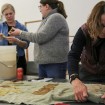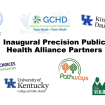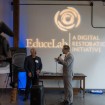Law Research with Mary Davis
Mary Davis is the Stites & Harbison Professor of Law and was named a 2016-2017 University Research Professor. She has been on the UK College of Law faculty for 25 years. Her work on federal preemption of state products liability laws has been cited by the U.S. Supreme Court.
She says her research has a direct connection to what she does in the classroom. "I'm about to begin teaching the Torts class for first-year law students. My scholarship is in the Torts law subset of products liability. Knowing the foundational historical background, knowing the trends, knowing where the law is changing, enables me to help my students understand where we've been—because lawyers have to understand where we've been—and where we’re going," Davis says.
She describes a law professor as part anthropologist, part theorist and philosopher, and part translator. "Some of my scholarship, and most of my colleagues', is driven to help the practice of law: describing complicated areas of the law and making it clearer for lawyers and judges."
In this podcast, Davis talks about the engaged faculty and passionate student community at the College of Law and how law scholarship impacts society.
Law Research with Mary Davis - Podcast Transcript
Have you ever wondered who was doing the research that will impact your future? The research podcast lets you met those people, and learn how the University of Kentucky is exploring and strengthening our understanding of the world through research and discovery.
Here's Alicia Gregory, director of Research Communications.
Alicia: Today we’ll meet Mary Davis from the UK College of Law. She’s the Stites and Harbison Professor of Law, and was named a 2016 University Research Professor. Her work on federal preemption of state products liability laws has been cited by the U.S. Supreme Court. She begins by telling us how she ended up in Kentucky.
Mary Davis: Well, I grew up in Southern Virginia. The product of an air force marriage. My father and mother met in Germany, back in the early ’50s. And, so I grew up in a wonderful small town, sort of idyllic really. And then I went to school in Virginia. And then I went to Law School in North Carolina. And, ended up here 25 years ago. This is my 25th anniversary on the faculty at UK.
Alicia: Well, congratulations.
Mary Davis: Thank you! It's exciting to me, too.
Alicia: So, tell me a little about how you ended up at UK
Mary Davis: I had always been one of those people who thought she would teach. That's sort of in my DNA. You know that about yourself. And so when I decided to go to law school, it wasn't clear to me that I would get into law and teaching, but it became clear that I really was drawn to that part of law. So, I practiced law for six years, had a perfectly satisfying law practice, but then, I just decided that I thought my passion would be in teaching. And in law teaching.
There is an organization that works as a clearing house for obtaining law professorship positions, and when I decided to apply for a law professorship position, I was fortunate enough to be invited to interview here. Came to Lexington and met the most fabulous faculty members at UK. We are... we are so blessed to have an amazing array of fabulous educators, wonderful intellects. It's a great law school community. And, I said yes to their offer 25 years ago, and I'm still here. And… and thrilled to have made my career here.
Alicia: So, tell me a little bit about what research looks like in the field of law. 'Cause I think a lot of people don’t really understand.
Mary Davis: You're exactly right, and I'm thrilled for you to have asked that question. Because of the way that legal scholarship, legal resources evolve, legal scholarship works with those legal sources. So, we evaluate and study trends in the law. Trends in judicial opinions, trends in statutory enactments. We are future focused. We evaluate legal sources. People think of the law as sort of being dry and old, and it is. Many of our legal sources are still hundreds of years old. But we evaluate those in the background of current socioeconomic and other cultural moves. There's a little bit of anthropology in a law professor. But we are also very practically focused.
So, much of law professor scholarship is theoretical and foundational and philosophical. But there are also a component of it that is very practice oriented. So, some of my scholarship, and most of my colleagues, is driven to helping the practice of law. Describing complicated areas of the law and making it clearer for lawyers and judges. And then, the other side, is the more philosophical and theoretical. So, we are fortunate enough to have an impact on the legal practice, and clarity of the law, and making it more comprehensive and understandable. And also, in evaluating backgrounds in the law, and theoretical and foundational changes that can impact those changes in legal doctrine going forward.
Alicia: So, I imagine that impacts heavily what you are teaching in classes.
Mary Davis: Yes. Absolutely. For example, I'm about to begin teaching the Torts class for first-year law students. And, my scholarship is in the Tort law subset product liability. And, knowing the foundational, historical background, knowing the trends, knowing where the law is changing, enables me to help my students understand where we've been - because lawyers have to understand where we've been. And also to think for their lives as lawyers, where are those trends going to be? How are things changing? Helping them, 21st-century students, understand how their backgrounds in economics, and philosophy, and history, will impact the future of the evolution of legal doctrine. It's very important. My scholarship very definitely informs my teaching. Very definitely.
Alicia: Tell me a little bit about products liability. I know that's an area you've worked in for a while.
Mary Davis: Yeah. So, products liability is a subset of Tort law. Tort law is the law of civil rights and responsibilities. People think of it like personal injury law. It's... it's a good bit more than that. So, products liability is the subset that deals with injuries that stem from product failure. So, when you have a car whose air bag, when it deploys, shots out shards of metal, injuring people, that's a product defect. Very possibility, very probably. And my field of the law evaluates when product manufactures and sellers should be responsible for the injuries that those products cause. Product liability is a really interesting subset of Tort law, because it also involves promises. There's a contract element to it. I buy a car from you, and you sell me, and you promise a certain quality. But there's also the side of Tort law that comes in and says, in spite of those promises, even if you didn't promise perfect product quality, the law is going to make you responsible for some of the injuries that stem from your product failure.
It also is a subset of Tort law that really is on the cutting edge of how we decide when injuries that stem from products should be allocated to the product manufacturer, and when they should fall on the consumer, right? So, there are elements of product liability law that focus very heavily on consumer responsibility. When should the person who has some blameworthiness, if you will, for his or her injuries, bear some responsibility for that? So, you can see from my prior explanation of the philosophical, theoretical to the practical, there's a really fascinating blend of both of those sides of legal scholarship and products' liability.
Alicia: So, tell me a little bit about some of your current work. What are you working on right now?
Mary Davis: So, I have, over the last ten or so years, written very heavily in the field of product liability that deals with the relationship between federal regulation of products and state law regulation of products. So, that's a layer of the field that I had mentioned to you before. And that particular subset of product liability law, it's also a constitutional law doctrine that deals with the relationship between federal and state law. It's called preemption. So, in that area, there have been 20 or so U.S. Supreme Court opinions decided in the last several years. Which is an enormous amount for the Supreme Court to take in this field, because it is very heavily state law oriented. And, typically the Supreme Court doesn't deal with state law issues. And they have said, many, many things; many words, many pages have been written on this subject.
So, I've decided to take some of those opinions, and overlay them, as well as my own scholarship, into the field of pharmaceutical liability. A number of the Supreme Court opinions have dealt with pharmaceutical liability, and this very uneasy tension between how state law regulates liability from injuries from pharmaceuticals, and how the federal government, which is very robust in the area of pharmaceutical liability, should govern. And so, I have written a little bit on some of the cases, earlier cases that have dealt with that subject, but it seems to me an area that is begging for clarity. It's also an area that is, in my view, begging for a fresh look at how liability for pharmaceutical injuries should be evaluated philosophically.
Mary Davis: Historically, pharmaceutical companies have been liable on a variety of state law doctrines. Many of them, very pharmaceutical company friendly, but not all. With 50 states, we have a variety of different state Tort law doctrines that impose liability. Given the way that health care is changing, given the enormous impact of the federal affordable care act, and how that may impact liability issues, it seems to me that now would be a good time to really think from first principles, going forward, about pharmaceutical liability.
I'm very excited to be working interdisciplinarily with some colleagues in the pharmaceutical sciences, some colleagues in the area of law and economics, because there are very important incentives that we create when impose liability on manufacturers. And, that's one of the things I'm most excited about going forward. I haven't done a lot of interdisciplinary work, and now is a great opportunity for me to do that. And we have some amazing scholars here at UK that I hope to engage, and others at other universities as well.
Alicia: So, you were recently named a University Research Professor.
Mary Davis: Yes.
Alicia: What does that recognition mean to you?
Mary Davis: It is hard for me to put that into words. I have to give kudos and thanks to Vice President Lisa Cassis, for opening up that particular award to scholars from all colleges at the University. And, I'm so grateful to her for being willing to and acknowledging the need to recognize scholars from across campus. I am delighted to be one of those. I have to say, you know, law professors, I don't think are necessarily considered to have the scholarly program that say, my biologist, or physicist, or medical school, medical scientists have. But we do. We impact the way that society governs itself. In very important critical ways, all across the spectrum; criminal law, civil law, procedural law. And, I'm delighted to be a person who has been selected to represent my colleagues.
And, I do consider it that. College of Law faculty scholars are nationally and internationally known. I'm proud to be one of those people, and I'm delighted to have an opportunity to carry the banner for my colleagues. And for myself. I'm very proud of my product liability scholarship. It is... it has been very impact full across a wide variety of fields in state law. State judges cite me. I worked on a treatise that is a comprehensive explanation of product liability law. My product liability case book is used across the country to help teach students the field. So, I'm... I'm very pleased to have that contribution to the law be acknowledged in a way that the university professorship does. Very thankful.
Alicia: What do you find to be the most rewarding part of working with UK law students?
Mary Davis: I have taught at a number of different law schools over the course of my career. Some top law schools. And, I find that our students are competitive with law students anywhere in the country. They are passionate and they are talented. But, they’re also engaged with one another in a really important way. I don't know whether it's the culture that we've created at UK law, or whether it's the nature of our students and their backgrounds. And we do an excellent job in our admissions office in getting students from a wide variety of backgrounds.
The students come here with a real passion for what they're doing. They don't come here thinking oh, I'll get a law degree and see what else I might want to do later. They're very focused on their passion for this field. Now, they may not always know where they're going to take that law degree, but they are wide open to the opportunities. So, when I walk into a class of first years, and I'm thinking mostly about first years because they are bright eyed, engaged, and energized by the opportunity. They're grateful for the opportunity. They are not hyper-competitive with one another. They're very supportive of one another. And, they are all in.
25 years later, I can't wait to start. Because they have that spark. Our students are as passionate about how they can contribute and give back to their communities. Even if they decide they want a private practice of law, they give back to their clients in the way that they serve those clients. And, if they are engaged in public service or in politics and government service, they are passionate about it. So, I think that sets our law school students apart.
Alicia: So, what do you like best about working at UK?
Mary Davis: I think that I have the best faculty colleagues in the world. I don't think that's an overstatement. We are not a large faculty, we are a faculty though of engaged scholars, but we’re friends. We are goodhearted colleagues. We have respect for one another. We don't always agree, but we have a wonderful way of debating without being argumentative with one another. I am very fortunate to be a part of this collegial faculty. And, that's true from top to bottom. From our senior faculty members, of whom I am now one, and junior faculty colleagues, who are wonderful, engaged scholars already in their careers. Who are members of a community. You know, you think sometimes about law faculties as being persons with amazing intellect who work in their offices and write law journal articles, and they go out and travel and speak at conventions and conferences and the like, and we do that. But, we come back to our faculty and we meet and we discuss, significantly, the academic policies of our school. We are true faculty governed in my college. And we do that with respect for one another, and fondness for one another.
That said, every year, first year students come in, and they make me better. That's something else about the College of Law, is we are active, engaged educators. We do use the Socratic Method, we do make you talk with us, we do make you dig into the legal resources and understand them. We expect our students to be engaged with us every day. Present, intentional, thoughtful. We are training the society's next leaders, both in the law, and in government service and public service. We take that very seriously, and so do they. You should come to one of my first year law school classes, and see what it's like. Not just because of me, but because of the dialogue and the engagement that we have together. It's a great place to work, it's a great place to teach. That dynamic is really second to none.
Thank you for listening to the Research Podcast. To subscribe to our podcasts on Soundcloud or iTunes, search University of Kentucky research media and visit our site; reveal.uky.edu


